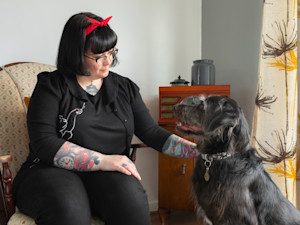Backlash Grows Against Turkey’s ‘Massacre Law’ Aimed At Street Dogs – Here’s How You Can Help
The new bill, seen as a potential death sentence for many of Turkey’s cherished street dogs, was passed in July. Activists tell us they will keep on fighting

Share Article
A devastating new law aimed at getting stray dogs off the streets of Turkey was approved by the country’s parliamentopens in new tab at the end of July, whilst thousands of animal lovers protested outside.
The 17-article legislation, dubbed by campaigners as the ‘massacre law’opens in new tab mandates that municipalities will have to collect stray dogs and house them in government-run shelters where they would be neutered and spayed. Dogs that are terminally ill, pose a heath risk to humans, or are aggressive will be euthanised under the bill, which is going ahead despite appeals from opposition parties and activists.

Get (totally free) deals for food, treats, accessories, tech and way more pet parenting must-haves.
President Recep Tayyip Erdoğan, whose ruling party proposed the bill, estimates that around four million stray dogs roam Turkey’s streets and rural areas. On the other side, the Republican People’s Party (CHP) has vowed to challenge the law in the Constitutional Court. Murat Emir, a prominent CHP deputy, didn’t hold back, telling MailOnline, “You have made a law that is morally, conscientiously and legally broken. You cannot wash your hands of blood.”
The landmark decision, which passed with 275 votes in favour and 224 against, mandates that all municipalities allocate at least 0.3 percent of their annual budgets to animal rehabilitation services, including the construction and upgrading of shelters. While this legislation sets a 2028 deadline for compliance, animal rights advocates are already calling for an increased focus on neutering campaigns, arguing that prevention is the key to managing stray populations.
The controversial legislation has sparked widespread protests, with thousands taking to the streets in recent weeks. Demonstrators, occasionally clashing with police, carried banners emblazoned with slogans such as “You cannot kill them” and “Take back the law,” signalling the depth of public outcry in the country.
While the passing of the bill is a deeply upsetting blow to campaigners, but it does not signal the end of the fight. Ahmet Kemal Senpolat, a lawyer and president of Animal Rights Federation in Turkey (HAYTAPopens in new tab) tells us that the passing of the bill is “frustrating”, but that it can be appealed in the Constitutional Court.
“When it comes to the implications of the bill for us, it will not change much on our side as we are committed to defend the rights of those innocent living things with all [the] means we have.”
He continues: “animal rights preservation is a long-term, exhausting stride and we have been fighting bearing this fact in our mind since the beginning.” HAYTAP, he says, is committed to finding legal ways forwards and promises that, “our federation and activists across Turkey will start searching for collaborators to save millions of animals”.
Although committed to continuing the fight, the bill has hit Ahmet and other activists hard. “We have a shock and low morale like all concerned parties.”
“[It is] impossible to numerate their evils in our country” a press release posted by HAYTAP on Facebookopens in new tab reads. “Countless lives lost no matter children, adults or animals, numerous lives wasted, so [many] precious forests and rivers terminated.”
“And this last vote of theirs has proven once again their position at the lowest degree of humanity. They are simply bad people, no debate.”
How did we get here?
Turkish people are renowned for their love of animals, with a long history opens in new tab of taking care of street dogs throughout the country.
Take Bojiopens in new tab, for instance. A dog who regularly rode Istanbul’s public transport and captured worldwide attention. He’s even got his own Twitteropens in new tab and Instagramopens in new tab account. Elsewhere, Tarçınopens in new tab, a street dog who was friends to many in Moda, lives on as a statue. In 2021, filmmaker Elizabeth Lo immortalised the street dogs of Istanbul in her documentaryopens in new tab Strays.
However, the stray dog population has grown quickly. In 2004opens in new tab, a law was passed mandating all Turkish municipalities over a certain population threshold would be required to build public shelters and carry out ‘trap, neuter, release’ programmes. It was the government’s solution to eradicating the stray dog problem.
“But this law has not been enforced,” says Lisanne Hilley, a 34-year-old activist living in Aydın, Turkey who runs a private shelter for more than 70 dogs and partners with Animal Friends of Turkeyopens in new tab. “Although there are more than 1,300 municipalities, there are only around 200 government shelters. Many of these shelters have been performing neuter campaigns, but they don’t have the resources to reach the full stray dog population.”
Even when there have been sterilisation programmes in big cities, surrounding villages weren’t targeted, so the impact of sterilisation efforts was only temporary. After a couple of years, dogs from surrounding villages would migrate into cities and the population would grow back to what it was previously.
Murat Pinar, who has been campaigning to keep Turkey’s streets safe from stray dogs, saysopens in new tab at least 75 people, including 44 children, were killed as a result of attacks or by traffic accidents caused by dogs since 2022.
However, although animal rights activists agree there is a problem in Turkey, they fear the new legislation will lead to dogs being unnecessarily killed or being neglected in overcrowded shelters.
“Over the past ten years, the street dog population has been growing out of control,” says Lisanne. “There are dogs everywhere on the streets. Local rescuers and charities are completely overwhelmed and no one can keep up with the amount of sick, injured, abandoned and vulnerable dogs needing help. Private shelters are bursting at the seams.”
Ahmet explains that another reason the stray dog population continues to rise is the “huge amount of uncontrolled dog breeding and trading” in Turkey.
“People buy a dog and then don’t sterilise it, or they just dump it on the streets, which adds to the problem,” he says.
Lisanne adds that Turkish people don’t often neuter their dogs because they are “loving, emotional and nurturing” people, and they love dogs.
“This is a beautiful part of Turkish culture, but in this instance, it creates more problems,” she says. “A significant part of the population believes that neutering a dog, especially a female dog, is a cruel act, because you are taking away the animal’s right to be a mother. This means that people think they are actually doing something good by getting their dogs pregnant and having them reproduce.”
She says on farms and in villages, many dogs aren’t even microchipped or registered, both required under Turkish law, but the Turkish authorities “have turned a blind eye to this.”
“While the municipalities already don‘t have the resources, facilities and the infrastructure to keep up with the amount of stray dogs, a big part of the Turkish population is also actively contributing to the number of dogs in the country, many of which end up on the streets,” she says.
What does the new law say?
The new bill proposes that all stray dogs be removed from the streets and put into shelters, rather than caught, sterilised and released. Dogs that are in pain, terminally ill, pose a health risk to humans, or are aggressive would be euthanised. Mayors who fail to meet their responsibilities in controlling stray dogs would face imprisonment ranging from six months to two years.
Ahmet, who often visits shelters all over the country as part of his work, worries that this plan will lead to inhumane treatment of dogs.
“These places are not shelters – they are prisons, or dead stations, where dogs enter and are either starved to death or killed otherwise,” he says. “If our president wants to put four million dogs in shelters, realistically 6.5 million square meters of land would need to be built.” He worries this means that dogs will simply be killed instead.
With the bill’s passing, Lisanne worries municipalities and government shelters will be given “free reign” to collect dogs from the streets and euthanise whichever ones they want by claiming the dog was displaying symptoms of illness or was aggressive.
Lisanne is also concerned about the impact on private shelters too.
“Although the bill doesn’t apply to private shelters, it will have a big impact on private rescuers because there will be a rush to save as many dogs from government shelters as possible,” she says. “All private shelters in Turkey are already way over capacity and are bursting at the seams, but if there is a serious threat to the thousands of dogs in government shelters, we will try to rescue as many as possible, pushing us even more over capacity, meaning our resources are spread even more thin and we will be struggling to keep up even more.”
Will the new law work?
Not far from Turkey, in Romania, a similar type of mass euthanisation programme was implemented between 2001 and 2007, costing the country $12 million. Despite the efforts at reducing the dog population, there are at least 600,000 dogsopens in new tab now living on the Romanian streets, more than in any other European country.
Both Lisanne and Ahmet think the result will be the same for Turkey as a result of the bill.
“The bill fails to address the root problem,” Ahmet says. “It just treats the symptoms.”
The ‘root’ problems being too little spaying and neutering, too few shelters, not enough government support for vets to offer free spaying and neutering, and lack of education about spaying and neutering in the general population.
“Unless they can catch every single dog in the wider area at the same time, whenever you remove dogs from an area, this will just leave this area open to new stray and abandoned dogs to move in and start living there, and those dogs will start to reproduce,” says Lisanne.
What are the other options?
Although activists think the bill is both inhumane and will be ineffective, they agree that something needs to be done about the stray dog population in Turkey.
Ahmet and fellow colleagues within HAYTAP are petitioningopens in new tab for a pilot ‘catch-neuter-vaccinate-release’ five-year project in the West Black Sea area of Turkey, as its isolated geographical boundaries make it ideal for a controlled study. If it is effective, which Ahmet thinks it will be, it could be expanded.
The group is also advocating for legislation banning buying and selling of dogs online, puppy mills to be closed down, the banning of dog imports into Turkey, and children to be educated on how to interact with dogs to prevent aggression.
Lisanne adds that involvement from both municipalities and the government is essential.
“The only proven solution is a huge, countrywide effort to spay and neuter both stray dogs and dogs with owners,” she said. “Municipalities need to increase the capacity of shelters to be able to spay and neuter more dogs. The government needs to allow, encourage and even mandate private vets to carry out free spay and neuter operations. Spaying or neutering should be free in Turkey, whether it is a stray animal or a family pet. The government will need to allocate budget to compensate the private vet clinics of course.”
Now the bill has passed, Ahmet can’t bear to think of the impact.
“Millions of dogs will come to a brutal end, and there is nothing we can do to stop it,” he says. “Because they will all be captured and kept behind closed doors.”
How you can help
Charities and animal rights activists have committed to continuing to advocate for the humane treatment of animals and attempting to care for and re-home them.
To join in the fight you can share images and videos on social mediaopens in new tab – especially those with info written in languages other than Turkish – to help generate a global awareness.
There is also a petition to signopens in new tab (a translated version exists hereopens in new tab) that calls for an urgent sterilisation campaign and the banning of pet sales instead of rounding up and euthanising them, and another petitionopens in new tab calling on the Turkish government to reverse the bill.
If you’re able to, you can also donate money to charities such as Animal Friends of Turkeyopens in new tab or HAYTAPopens in new tab.
As Ahmet writes on HAYTAP's Facebook pageopens in new tab: “This is a war between the bads and the goods. And we are always on the side of innocent lives.”
“We shall never give up!”

Lauren Crosby Medlicott
Lauren is a freelance journalist who lives with her family and black labrador, Betsie, in the south Wales valleys. When she’s not working, she loves going for a dip in a nearby river and hiking in the Brecon Beacons.
Related articles
![Tabby cat]()
RSPCA Issues Warning to Be ‘Extra-Vigilant’ This Summer, As Attacks On Cats More Than Double
The charity’s latest figures reveal that cats are increasingly falling victim to deliberate weapon attacks
![a man with dreadlocks holds up a french bulldog puppy and they both look at the camera]()
BBC Documentary Highlights The Sobering Repercussions Of Covid’s Puppy Boom
”It’s the commodification of animals, it’s social currency – whether it’s to look hard or manly or to emulate a celebrity. We put pressure on that dog to play a role in our lives”
![A dog lying on a rug with a litter of puppies feeding from her.]()
Why You Shouldn’t Adopt a Pet From Social Media or Buying/Selling Sites
It’s not quite the same as buying secondhand clothes…
![a man smiles at a fluffy white dog in a pet food store]()
Pet Food Banks Can Help If You’re Struggling to Feed Your Pet
Plus, how to donate to pet food banks to help other pet parents in need
![woman with tattoos strokes big grey dog]()
The Dog Fostering Lifeline Helping People Flee Domestic Abuse
Beloved pets are often used by perpetrators of domestic abuse to manipulate their victims. That’s why Dogs Trust runs a specialist service to temporarily home dogs while their parents seek safety








